Discuss this article on the forums
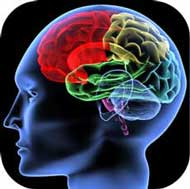 In 2008 I participated in Dr. Baraniuk’s spinal tap study at Georgetown University in Washington, D.C. Some readers may remember how exciting Dr. Baraniuk’s first proteome study was; it was the easy winner of the Phoenix Rising Paper of the Year.
In 2008 I participated in Dr. Baraniuk’s spinal tap study at Georgetown University in Washington, D.C. Some readers may remember how exciting Dr. Baraniuk’s first proteome study was; it was the easy winner of the Phoenix Rising Paper of the Year.The study suggested that chronic fatigue syndrome (ME/CFS) patients had unusual proteins in their cerebral spinal fluid. These results suggested that clumps of abnormally folded proteins could be causing small punctures in the blood vessels of ME/CFS patients brains.
These punctures, in turn, could cause blood to leak out into the brain causing the symptoms of ME/CFS. This, the first attempt at finding a protein (as opposed to gene) signature, was stunningly successful in its ability to clearly elucidate a possible cause of chronic fatigue syndrome.Unique Protein Signature? – These proteins consisted of the following:
- two proteins suggesting a protease – antiprotease imbalance is present. This implicates increased production of elastase, an enzyme Dr. De Meirleir believes plays a role.
- several proteins suggesting small amounts of bleeding in the brain could be caused by the aggregation of proteins (amyloids) in the blood vessesl.
- Another protein suggests increased free radical production is present
- Another suggests that problems with the vasoconstriction of the blood vessels and damage to the cells lining the blood vessels (the endothelial cells).
- Another protein is associated with inflammation
- One protein suggesting altered rates of cell suicide (apoptosis) are present
I was excited to meet Dr. Baraniuk and was even happier to find out that both he and his assistant Dr. Murugam Ravindran were quite willing to sit down and discuss what they believed chronic fatigue syndrome (ME/CFS) was all about.
Yes – It’s All in Your Head. Dr. Ravindran, Dr. Baraniuk’s young assistant, took great delight in telling me again and again that yes, ME/CFS was indeed all in my head. He didn’t mean it was psychological, though. Dr. Baraniuk’s proteome paper stated that their “proteomic model provides initial objective evidence for the legitimacy of CFS as adistinct neurological disease’ Indeed in an interview Baraniuk stated that he believed his study “ushers in a whole new era for identifying [and] recognizing the legitimacy of these disorders.” (!).
Dr. Baraniuk is clearly enthusiastic about the potential of his study to uncover key elements of this disease. It’s take a closer look at some of the specific proteins he’s most interested in.
Amyloid Proteins: The amyloidic proteins appear to be the key elements of the protein signature; the inflammation, hemorrhagic elements, increased cell death and free radical production could all derive from the body’s attempt to recover from damage done by amyloidic proteins bunching up, impeding blood flow and finally puncturing the blood vessel walls in the brain.
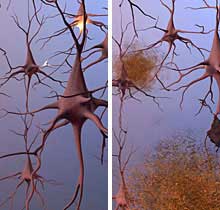 Amyloid proteins are proteins that generally get folded improperly as they are being made. Since shape in a protein is everything – proteins trigger cellular activity by locking into each other like 3-dimensional keys – improper folding can turn a protein useless or even dangerous.
Amyloid proteins are proteins that generally get folded improperly as they are being made. Since shape in a protein is everything – proteins trigger cellular activity by locking into each other like 3-dimensional keys – improper folding can turn a protein useless or even dangerous.
The types of amyloid proteins Dr. Baraniuk found in chronic fatigue syndrome (ME/CFS) patients are unique to the brain. These same general types of proteins are also found in neurodegenerative diseases such as Alzheimer’s and Down’s syndrome.
Improperly folded proteins can cause two major problems; (a) because the proteins are not doing the job they’re supposed to do they can cause vital processes to be neglected and (b) if they’re not removed quickly enough they can build up and cause damage.
Possible Causes? – What could cause amyloid proteins to build up present in ME/CFS patients? There are at least three possibilities.
(1) ME/CFS patients could be producing more of these proteins than normal; that is their ability to produce normal proteins could be impaired. This would suggest a deficit exists in very basic cellular processes in the brain.
(2) The processes designed to remove damaged proteins (some always inevitably occur) may be underperforming – allowing excessive accumulations of damaged proteins to build up.
(3) It’s also possible but less likely, in Dr. Baraniuk’s opinion, that high levels of oxidative stress are damaging correctly built proteins.
How do these proteins affect ME/CFS patients? First of all Dr. Baraniuk believes they’ve made it difficult for ME/CFS patient’s brains to interpret and respond correctly to the signals coming from the body. He believes that the part of the brain that controls our breathing, heart rate, blood flows, immune system etc., namely, the autonomic nervous system, appears not to be functioning normally.
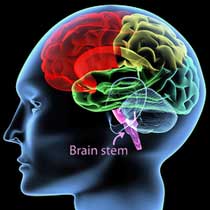 Focus on the Brainstem – In particular he’s focused on the gating mechanisms in the lower part of the brain that filter the amount of information that the upper part of the brain receives. He believes that the neural circuits running from the spinal cord to the brainstem are not working properly and that the system that should close and latch those gates is dysfunctional. These gates filter out unnecessary information and protect the brain from being flooded with too much information. He believes they’ve been left wide open in chronic fatigue syndrome (ME/CFS). The most critical neural circuit appears to be the Papez Circuit which ties together the anterior cingulate, amygdala and hippocampus. It’s associated with heightened awareness and anxiety and effects autonomic nervous system functioning.
Focus on the Brainstem – In particular he’s focused on the gating mechanisms in the lower part of the brain that filter the amount of information that the upper part of the brain receives. He believes that the neural circuits running from the spinal cord to the brainstem are not working properly and that the system that should close and latch those gates is dysfunctional. These gates filter out unnecessary information and protect the brain from being flooded with too much information. He believes they’ve been left wide open in chronic fatigue syndrome (ME/CFS). The most critical neural circuit appears to be the Papez Circuit which ties together the anterior cingulate, amygdala and hippocampus. It’s associated with heightened awareness and anxiety and effects autonomic nervous system functioning.
Interestingly studies have shown that the gating mechanisms involving pain are wide open in fibromyalgia patients. (FM patients display over activation of the pain producing and under activation of the pain inhibiting circuits in the brain. Dr. Baraniuk believes ME/CFS, FM, GWS, etc. are all subsets of each other.) Which problem is accentuated in each person may depend on where small ruptures in the blood vessels occur.
‘Arousal’ and CFS. My experiences with feeling wired/tired, muscle tension, rushing thoughts, an inability to settle down and the positive results some people have seen from mindfulness programs like Ashok Gupta’s Amygdala Retraining program – which are intended to tamp down the stress response – lead me to ask him straight out what he thought about ‘system arousal’ in ME/CFS.
Dr. Baraniuk repeatedly stated that he does not believe CFS is a ‘psychiatric condition’; he believes it is a neurological condition possibly caused by the damage reflected in the proteome signature. He strongly believes, though, that the brain confusion just described creates anxiety-like components in this disease and that the medical profession took a 20 year tramp down the wrong rabbit hole when they focused on depression. The heightened sensory awareness seen most prominently in fibromyalgia but also to some extent in ME/CFS is associated with increased not depressed brain activity. (The only disease the Israeli researchers Naschitz was unable to differentiate from chronic fatigue syndrome (ME/CFS) using measures of autonomic nervous system functioning was anxiety.)
The inherent plasticity of the brain allows people, however, as he put it to “purposefully introduce conscious actions to block that abnormal circuit’ by doing behavioral therapies such as meditation, Amygdala Retraining program, cognitive behavioral therapy, etc. and he’s all for them. Another way to slow down the overactivity of the brain is to use Klonopin – which numerous physicians have described as the most helpful drug for ME/CFS patients.
A Key Gene? Dr. Baraniuk is focusing on a particular gene – CNDP1 – that has a long and short form. His evidence suggests that GWS (and ME/CFS) patients tend to have the longer version. This form of the gene, interestingly enough, given all the evidence of increased oxidative stress in this disease, appears to impair the ability of the brain to protect itself from free radical attack.
A Key Protein – Since genes produce proteins linking a poorly functioning gene with a ‘bad’ protein would be a considerable step forward; something other researchers have not done. The second part of the study is to attack the problem with treatment. He doesn’t expect miracles but if successful he hopes it could lead to a 10-50% improvement.
Too Much Stress in ME/CFS or Too Much Pressure? – Besides examining proteins in the spinal fluid a second component of the spinal tap involved determining spinal fluid pressure. Dr. Ravindran explained that Dr. Frazier Henderson – a neurosurgeon that Dr. Baraniuk works with – believes excessive spinal fluid p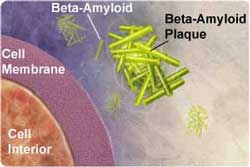 ressure could be disrupting nervous system signals to the brain in chronic fatigue syndrome (ME/CFS).
ressure could be disrupting nervous system signals to the brain in chronic fatigue syndrome (ME/CFS).
(Dr. Mavrindran informed me that since the spinal tap relieves spinal fluid pressure that I might experience some relief after the spinal tap. My pressure was a bit higher than normal (10-14; mine-18) but not quite in the accepted high range (20). While my spinal tap was decidedly not a pleasant experience I did experience substantial relief afterwards; cognitively I felt much clearer and physically I felt light and relaxed for some hours. It was if some overlying tension (anxiety) had been removed.
The Autonomic Nervous System (ANS) Connection – Dr. Baraniuk measured ANS functioning using handgrip and nasal tests. As the handgrip tests stresses the ANS and he measures it’s functioning using what looks like a horn that he places into your nose. Suffice it to say it’s a bizarre (but painless) Test. When we contract the muscles our diastolic blood pressure should increase. The diastolic blood pressure is the low reading in the blood pressure test. It’s increase reflects a general ‘tightening’ in the blood vessels that allows us to push more blood to the small capillaries in the muscles as we exercise.
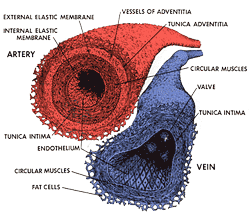 Many migraine and ME/CFS patients are sensitive to light and I asked Dr. Mavrindrin about this. He noted that the vasoconstrictor Imitrex is used to treat migraine – another hypersensitivity reaction. My notes suggest that Dr. Baraniuk has used Imitrex successfully to treat light sensitivity reactions in ME/CFS.
Many migraine and ME/CFS patients are sensitive to light and I asked Dr. Mavrindrin about this. He noted that the vasoconstrictor Imitrex is used to treat migraine – another hypersensitivity reaction. My notes suggest that Dr. Baraniuk has used Imitrex successfully to treat light sensitivity reactions in ME/CFS.
(In a CFSAC meeting Dr. Row from Australia stated that the only thing that helped ME/CFS adolescents headaches was migraine medication. She said “it’s very uncommon for the headaches not to be managed by one of the migraine medications’. She was also focused on treating dizziness, and (neutrally mediated) cardiac symptoms -both of which imply autonomic nervous system dysfunction. She noted that the nausea she frequently encountered appeared to be a function of blood pressure problems – another possible ANS complication.)
Pathogens? – Dr. Baraniuk has not found any pathogens in his cerebral spinal fluid samples thus far.
GWS and ME/CFS – Dr. Baraniuk believes GWS/chronic fatigue syndrome (ME/CFS) are two facets of the same diamond; by looking through one side he hopes to illuminate the other. He’ll be looking for the same form of that gene he found in GWS in his present ME/CFS study (and in fact said it was present). In a year – when he has enough preliminary data – he hopes to apply for a similar study in ME/CFS. I laughed when he said he expected it to get rejected first and then hopefully get approved the next time around but he didn’t find that fact humorous at all.
The March of Technology: improvements in technology in the last few years are allowing Dr. Baraniuk and his team get a much more detailed look at patients cerebral spinal fluid than they could before. This suggests, of course, that as exciting as the last study was that the results of this study could be even more so, particularly given how comprehensive it is regards to the ANS functioning, etc. This study also indicates the kind of work at the National Institutes of Health funds when it’s on the ball. Even our biggest support group doesn’t have the funds to pay for a study like this. This kind of study is why we need to continue to pressure the National Institutes of Health and Centers for Disease Control to fund ME/CFS research.
The Study – CFS patients have been forthcoming but the study has been having a great deal of trouble finding healthy controls.
Thanks very much to Dr. Baraniuk and Dr. Mavrindrin for being willing to sit down and talk about these issues basically until I ran out of questions. Throughout the day and a half I spent there they were very accommodating.
- According to the NIH this study is still recruiting. You can contact Murugan at cfsresearch@georgetown.edu Click here for more information on the study.
